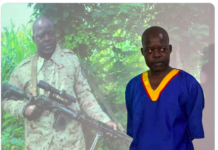These two countries have been involved in the destabilization of the Democratic Republic of Congo since 1996, and a series of UN reports attest to that. The most recent evidence of such deplorable actions is their ongoing support for the M23 rebel group.
Uganda and Rwanda are both involved in UN peacekeeping missions in different parts of the world [Somali, Central African Republic, South Sudan, Darfur, and Haiti]. Though they are there officially for peacekeeping, people know well that their unofficial priority is to serve US foreign policy interests in those respective countries.
Peacekeeping is also a business for the two autocratic leaders of Uganda and Rwanda, knowing particularly for example that Rwanda personnel on those missions don’t perceive their entire wages but only a fraction, while the rest is taken away from them by the ruling political party Rwandan Patriotic Front. No wonder the latter is reported to be the wealthiest political party in the world. Evidently this is only one of many of its sources of revenues.
In August 2010, people will remember how the Rwandan president Paul Kagame threatened the UN Security Council of withdrawing his peacekeepers if the UN didn’t remove from the Mapping report allegations about his forces for having committed in DRC crimes against humanity, war crimes, and crimes of genocide nature if they were brought before a court.
In a second report in the space of less than six months, Uganda particularly is officially pointed at by UN experts for its effective support for M23 rebel group. As a consequence, the country is menacing to withdraw its UN contingents of peacekeepers as did Rwanda before in almost similar circumstances.
If Uganda and Rwanda are using this position as UN peacekeeping countries to justify their right to impunity for crimes they are committing in the Democratic Republic of Congo, this should be unacceptable. The international community should not allow itself to be taken to ransom by regimes which devastate others and think of themselves as untouchables because they are peacekeepers and serve US interests in places where they intervene.
Armies which are accused of committing war crimes, crimes against humanity, and other crimes of genocide nature do not have any moral entitlement to be given UN missions of humanitarian character. Uganda and Rwanda should objectively quit, of legally forced to be removed from these international UN missions, which in fact have only humanitarian as name.
In 2007, the Rwandan General Karenzi Karake, was removed from his position of deputy commander of the African Union peacekeeping force in Darfur, Sudan, following pressure from human rights groups and Rwandan opposition parties. He was at the time listed among individuals that the French judge Jean-Louis Brugière had put out requesting international warrants for their roles in the assassination of former Rwandan president Juvenal Habyarimana and French crew members who died with him and other personalities on April 6th, 1994.
Principles that guided the removal of this general from international peacekeeping mission should prevail in the case of Rwanda and Uganda if the international community considers the strong accusations against the two countries about their crimes in DRC, which are included in different past and recent UN reports.




























































